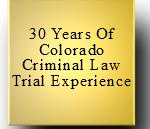Exclusively Practicing Only Colorado Criminal
Law - Defending Your Future

Colorado’s Motor Vehicle Theft laws can be confusing. For example if the owner of a car lets you use his car for two days and you keep it for a week is that motor vehicle theft? The answer may surprise you.
Under Colorado Revised Statutes Section 18-4-409(2), a person commits first degree aggravated motor vehicle theft:
“if he or she knowingly obtains or exercises control over the motor vehicle of another without authorization or by threat or deception.”
Almost all crimes require two basic components the mens rea (mental state of the actor in committing the crime) and the actus reus (the physical act that actually is the commission of the crime itself).
Understanding whether the State can prove it’s case involves a comprehensive knowledge of the crime with which you are charged. First, and always, one reads the law as of 2016:
Colorado Jury Instructions are used to guide juries in making the correct decision as they deliberate on the guilt or innocence of an individual charged with a crime in this case 18-4-409 First Degree Aggravated Motor Vehicle Theft.
In the case of 18-4-409 First Degree Aggravated Motor Vehicle Theft, the mental stateof “knowingly,” applies not only to the accused’s exercise of control over the vehicle, but also to his or her awareness of lack of authority.
Here is the relevant jury instruction for 18-4-409 First Degree Aggravated Motor Vehicle Theft:
To commit the crime of 18-4-409 First Degree Aggravated Motor Vehicle Theft (subpart retained over 24 hours) the State must prove beyond a reasonable doubt that the Defendant:
Reading the way the statute is drafted you can see that the culpable mental state, “knowingly,” applies not only to a defendant’s exercise of control over the vehicle, but also to his or her awareness of lack of authority.
Knowingly “stands alone” this is known as a “stand-alone element” and therefore it applies to the succeeding the elements that follow it. It applies to all of the subsequent elements of the offense.
A Defendant must therefore KNOW that the possession of the automobile was without authorization. This is NOT an objective, reasonable person test, it is a subjective test (what was in the mind of THIS Defendant) and therefore the affirmative defense of mistake of fact under §18-1-504(1)(a) would relieve the accused from criminal liability.
The affirmative defense of mistake of fact “negatives” the existence of a particular mental state essential to the commission of this offense in this case knowingly.
If a Defendant has “a good faith belief” based on a mistake of fact that he or she was entitled to take the vehicle, a Colorado jury should find him NOT guilty of motor vehicle theft.
While there is no statutory definition of the term “without authorization” or “authorization,”
Colorado courts have defined “without authorization” in this context to mean:
“that the owner of the property, or a person in possession of the property with the owner’s consent, has not given the actor permission to exercise control over the property.”
To summarize Section 18-4-409(2)(a) contemplates a culpable mental state involving an awareness by the offender that he is obtaining or exercising control over the vehicle of another and that his control is indeed without authorization.
If you found any of the information I have provided on this web page article helpful, please click the Share buttons for Twitter and Facebook so that others may also find it.
The reader is admonished that Colorado criminal law, like criminal law in every state and at the Federal level, changes constantly. The article appearing above was accurate at the time it was drafted but it cannot account for changes occurring after it was uploaded.
If, after reading this article, you have questions about your case and would like to consider retaining our law firm, we invite you to contact us at the Steinberg Colorado Criminal Defense Law Firm 303-627-7777.
Never stop fighting never stop believing in yourself and your right to due process of law. You will not be alone in court, H. Michael at your side every step of the way advocating for justice and the best possible result in your case.

About The Author: H. Michael Steinberg Email The Author at hmsteinberg@hotmail.com A Denver Colorado Criminal Defense Lawyer or call his office at 303-627-7777 during business hours or call his cell if you cannot wait and need his immediate assistance 720-220-2277. Attorney H. Michael Steinberg is passionate about criminal defense. His extensive knowledge and experience of Colorado Criminal Law gives him the edge you need to properly handle your case.
“A good criminal defense lawyer is someone who devotes themselves to their client’s case from beginning to end, always realizing that this case is the most important thing in that client’s life.”
You should be careful to make a responsible choice in selecting a Colorado Criminal Defense Lawyer and we encourage you to “vet” our firm. Over the last 30 plus years by focusing ONLY on Colorado criminal law H. Michael has had the necessary time to commit to the task of constantly updating himself on nearly every area of criminal law, to include Colorado criminal law and procedure and trial and courtroom practice. H. Michael works hard to get his clients the best possible results in and out of the courtroom. He has written, and continues to write, extensively on Colorado criminal law and he hopes this article helps you in some small way Understanding Colorado 18-4-409 First Degree Aggravated Motor Vehicle Theft You Must KNOW You Are Stealing A Car.